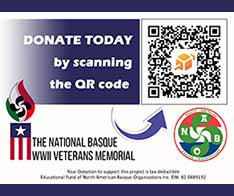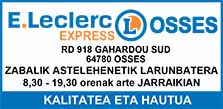Toni Milano. “More than Sheepherders: The American Basques of Elko County, Nevada,” has been in the works for several years, said Mallea-Olaetxe, who lived in the Elko from 1967 to 1970 when he served as a priest at St. Joseph’s Catholic Church.
“I met a lot of people, especially the Catholics and the Basques,” he said. “Some of them still call me ‘Father.’”
Although he moved to Reno, “I’ve never been too far away from Elko and the friends I had here.”
The book was written with the assistance of Jess Lopategui and contributions by Anita Anacabe Franzoia and Mercedes Mendive.
“Lopategui helped me a lot,” Mallea-Olaetxe said. “He didn’t write one word, but he gave me information.”
Mallea-Olaetxe, 85, said inspiration for the book came from other works about the Basques, such as “Amerikanuak: Basques in the New World” by William A. Douglass and Jon Bilbao, first published in 1975. He was living in Elko when the authors visited to conduct research.
“They published that and after that there was something unsaid about this town. There were a lot of unsaid things,” he said. There were hopes that Douglass would delve deeper into Elko County’s Basque history for another book, but it did not happen.
“Eventually, I approached Lopategui, and I said, ‘We’re going to write something otherwise all the history from the ‘70s to today is going to be lost.” Although Lopategui was initially doubtful anyone would be interested, Mallea-Olaetxe said he convinced him to get on board and start the book.
Mallea-Olaetxe said he opened his book with the statement, “‘If you want to write about the town and the county of Elko, where do you go for information. You go to Elko, and you ask the people,’ and that’s what we did.”
Anacabe Franzoia and Mendive, who have been longtime friends of Mallea-Olaetxe, each wrote a chapter. “Anita and I have been talking about this for many years and Mercedes Mendive? I baptized her.”
Mallea-Olaetxe collected interviews over the years from many people. “I talk to a lot of people, especially women, because women have been out of the picture for too long.”
Meet the author
A discussion and book signing featuring author Joxe Mallea-Olaetxe is set for 1:30 p.m. July 4 at the Northeastern Nevada Museum. Light refreshments will be provided.
The event is sponsored by the University of Nevada Press, Great Basin College, the Humanities Center at GBC and the museum.
He said what sets “More than Sheepherders” apart from “Amerikanuak” is the fact women are prominently featured in his book. “It doesn’t even talk about women,” Mallea-Olaetxe. “You’re leaving 50-51% of the Basques out of the picture.”
Both Mallea-Olaetxe and Lopategui share an immigrant background. Lopategui arrived in Elko from Spain in 1957 as a sheepherder. Mallea-Olaetxe grew up in Euskal Herria and immigrated to the United States in the mid-1960s.
“He’s from the old country, like I am, so there was no problem as far as collaboration.”
Seeing Basque generations grow
Mallea-Olaetxe, who has written other books, such as “Speaking Through the Aspens: Basque Tree Carvings in California and Nevada” and “The Basques of Reno and the Northeastern Sierra,” said the past was another inspiration for writing “More than Sheepherders.”
“One reason I wrote this is because I remember that Elko that no longer exists,” he said. “The focus is after 1970.”
In “Amerikanuak,” the authors focused on the Basque immigrants who arrived and worked as sheepherders, which prompted Mallea-Olaetxe to take his volume in a different direction and shine a spotlight on other aspects of the Basque community.
“The Douglass book is up to the sheep area. But this is not the sheep area. That’s why the title [is “More than Sheepherders”]. Those who retired from the sheep, what do you guys do afterwards? That’s what it is.”
Mallea-Olaetxe was also motivated to remember Basque immigrants tending to sheep “who nobody heard about or knew about or weren’t in town, nobody talked about them.”
The book also covers the shift in industries for the second- and third-generation Basques from shepherding to mining, construction, business and public service.
A prolific career
Years after leaving Elko, Mallea-Olaetxe went on to study at the University of Nevada, Reno, earning his Ph.D. in 1988 and teaching history and language classes at both UNR and Truckee Meadows Community College.
In addition to his books, Mallea-Olaetxe has dedicated himself to researching and studying Basque history, culture and arborglyphs. His writings can be found at basquehistory.com, featuring stories on Basque communities, Basque historical figures and events and in-depth studies into tree carvings.
On March 4, he received a Certificate of Appreciation presented by Assemblyman Bert Gurr and issued from the Nevada Legislature “for his unwavering dedication and passion for preserving Basque Heritage, particularly through a scholarly work which has illuminated the enduring contributions, stories traditions of Basque sheepherders, ensuring their legacy remains a vibrant part of Nevada’s rich history.”
Mallea-Olaetxe said although he has been retired from teaching for about 20 years, he said he planned to keep writing and researching.
Dedicated to Elko
The time Mallea-Olaetxe spent living in Elko nearly six decades ago, made an impact on him that never went away, prompting him to dedicate his book to the community, both Basque and non-Basque.
“My intention for writing this was to mention the people of Elko. The Basques, [even] the non-Basques. Italians, for example because they were married, and some others like John Carpenter, who was an honorary Basque, and Mormons.”
“I felt very much close to everybody,” he said.



 Lagun bati bidali
Lagun bati bidali Komentarioa gehitu
Komentarioa gehitu








